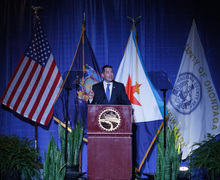Goldberg: Public needs immunizations to ensure health, safety
Since the start of 2015, a series of measles outbreaks has swept across the United States, with more than 150 confirmed cases as of Feb. 20. These outbreaks started in Disneyland, and since then other significant outbreaks have occurred in Illinois and Nevada.
Measles was declared eradicated from the U.S. in 2000, and has a vaccine with an effectiveness rating of almost 100 percent when administered properly. The Measles-Mumps-Rubella vaccine is one of the standard vaccines required in all 50 states for children to attend public school. There is absolutely no reason that there should be any sizable outbreaks across America of such an easily preventable disease.
The anti-vaccination movement began about a decade ago with concerns about connections between vaccinations and some chronic conditions, specifically autism. These claims have been completely refuted by the scientific community, and yet a significant population of “anti-vaxxers” continues to avoid vaccination by clear abuse of personal exemption clauses, backing themselves up with rhetoric often centering on personal freedom. Yet each and every time, the courts have shut them down.
Take for example the case of Henning Jacobson, a Cambridge resident who in 1905 sued the government after being fined for refusing to accept a vaccine during a Smallpox epidemic. His reason? Much like today, he was concerned that there were adverse medical effects associated with the vaccine. The Supreme Court found 7-2 that it was well within the rights of Massachusetts to use its police power to mandate these vaccines. They argued that just as the government could draft people into compulsory military service, they could mandate vaccinations — “acting in good faith for all, under the legislative sanction of the state.”
The problem here is that vaccinations protect the “herd.” According to the CDC, as long as 95 percent or more of the population is vaccinated, those who are not — which should be only those with compelling medical reasons not to be vaccinated — are considered safe. All 50 states offer medical exemptions, but there are a number of other ways to get out of mandatory vaccinations.
All states but Mississippi and West Virginia currently offer religious exemptions, which are meant to be given to those with strong, proven religious convictions against vaccination. However, in places like California where the standard is loosely “personal beliefs,” this is often taken advantage of by those with misguided medical concerns. In a recent case, the U.S. Court of Appeals for the Second Circuit took a rightfully firm stance, stating that the First Amendment guarantee of religious freedom “does not include liberty to expose the community or the child to communicable disease or the latter to ill health or death.”
This last line touches upon an oft-touted principle from the Declaration of Independence — the right to “life, liberty and the pursuit of happiness.” However, in just about every case regarding mandatory vaccinations — and in almost every case regarding a public health issue — the Supreme Court has made it clear that a person’s right to life and liberty does not extend so far as to dangerously infringe upon another’s right to life and liberty. Just as you don’t have the freedom to kill someone in pursuit of your own happiness, you don’t have the right to put others’ health at risk for your own personal or religious beliefs.
In the end, immunizations, like the government, work to serve the interest of the public as a whole. We as a nation need to take a firmer stand and not allow the reckless and misguided behavior of the few to endanger the well being of the majority.
Zach Goldberg is a senior economics, policy studies and energy and its impacts major. His column appears weekly. He can be reached at zrgoldbe@syr.edu and followed on Twitter @zgolds.
Published on February 26, 2015 at 12:23 am





